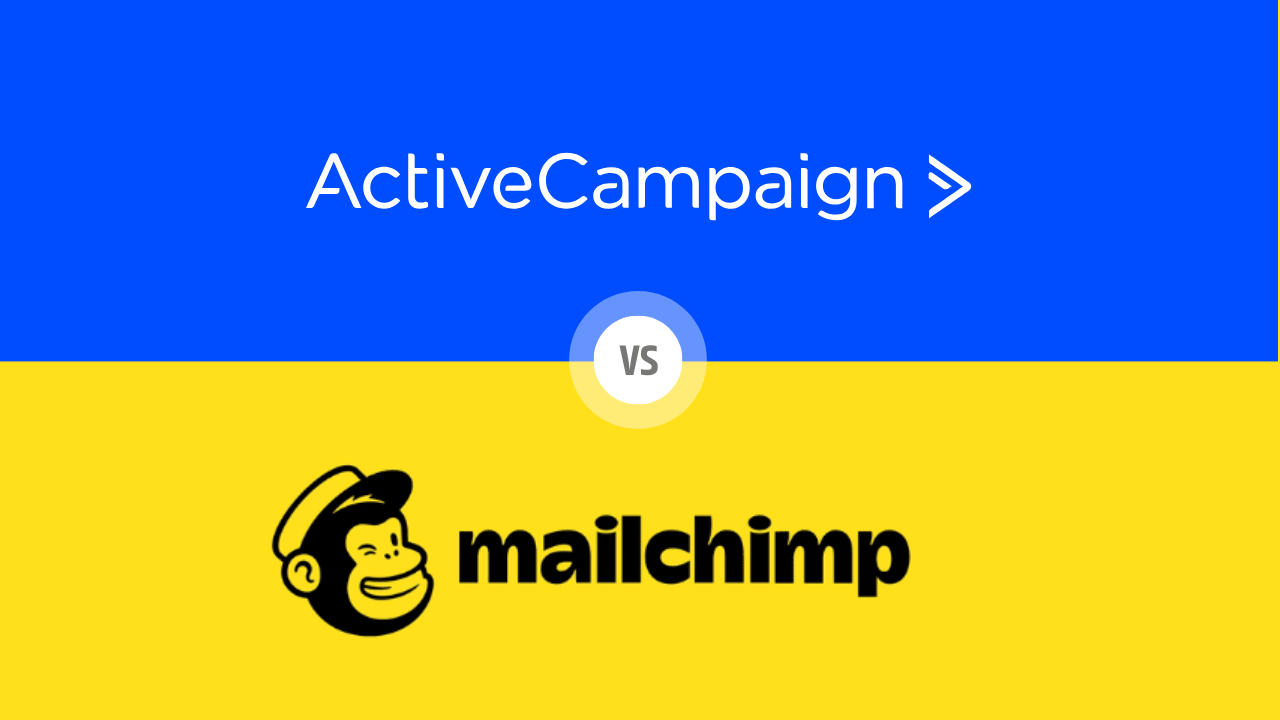Welcome to our comprehensive comparison between two powerhouse email marketing platforms: ActiveCampaign vs MailChimp. In today’s digital age, email marketing remains a cornerstone of successful marketing strategies, allowing businesses to connect with their audience, nurture leads, and drive conversions effectively. However, with numerous options available in the market, choosing the right email marketing platform can be a daunting task. That’s why we’ve created this guide to help you navigate the features, benefits, and drawbacks of ActiveCampaign and MailChimp, empowering you to make an informed decision that aligns with your business goals and objectives. Join us as we delve into the world of email marketing, exploring the capabilities, usability, and scalability of these two industry-leading platforms.
Table of Contents
Pricing and Plans
When comparing ActiveCampaign and MailChimp, one of the crucial factors to consider is their pricing structure and available plans. Let’s delve into the pricing details of both platforms to help you make an informed decision.
ActiveCampaign:
ActiveCampaign offers a range of pricing plans to cater to different business needs. Their plans are divided into four tiers: Lite, Plus, Professional, and Enterprise. The Lite plan starts at $29 per month for up to 1000 contacts, making it an affordable option for small businesses and startups. As your business grows, you can upgrade to higher-tier plans to unlock more advanced features such as Landing Pages, Lead Ads, Lead Scoring and E-commerce integrations. The Plus plan, starting at $49 per month, is ideal for growing businesses looking to scale their marketing efforts. The Professional and Enterprise plans are tailored for larger organizations with more extensive marketing requirements, offering advanced features like predictive sending, split testing, and custom reporting.
You can sign up for a 14-day free trial with ActiveCampaign. During the trial period, you’ll have access to a limited version of the platform, which includes up to 100 contacts and allows you to send up to 100 emails. This trial period gives you the opportunity to explore ActiveCampaign’s features and functionalities before deciding to subscribe to a paid plan.
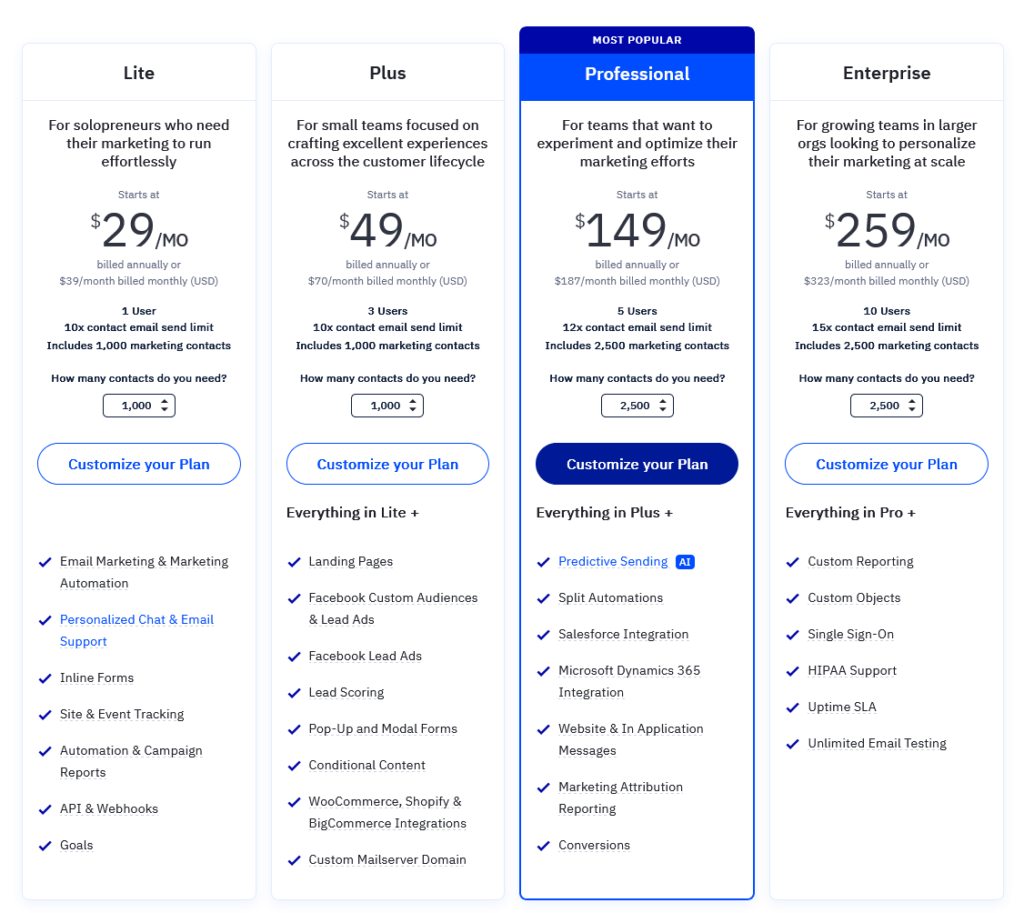
You can checkout the detailed feature list for all packages here.
MailChimp:
MailChimp also offers a variety of pricing plans designed to accommodate businesses of all sizes. They provide a Free plan for users with up to 500 contacts and 1,000 emails per month, making it an attractive option for startups and small businesses on a tight budget. MailChimp’s paid plans are categorized into three tiers: Essentials, Standard, and Premium. The Essentials plan starts at $13 per month, offering additional features such as A/B testing, custom branding, and advanced segmentation. The Standard and Premium plans are suitable for businesses looking for more robust marketing automation capabilities, with pricing based on the number of contacts and desired features.
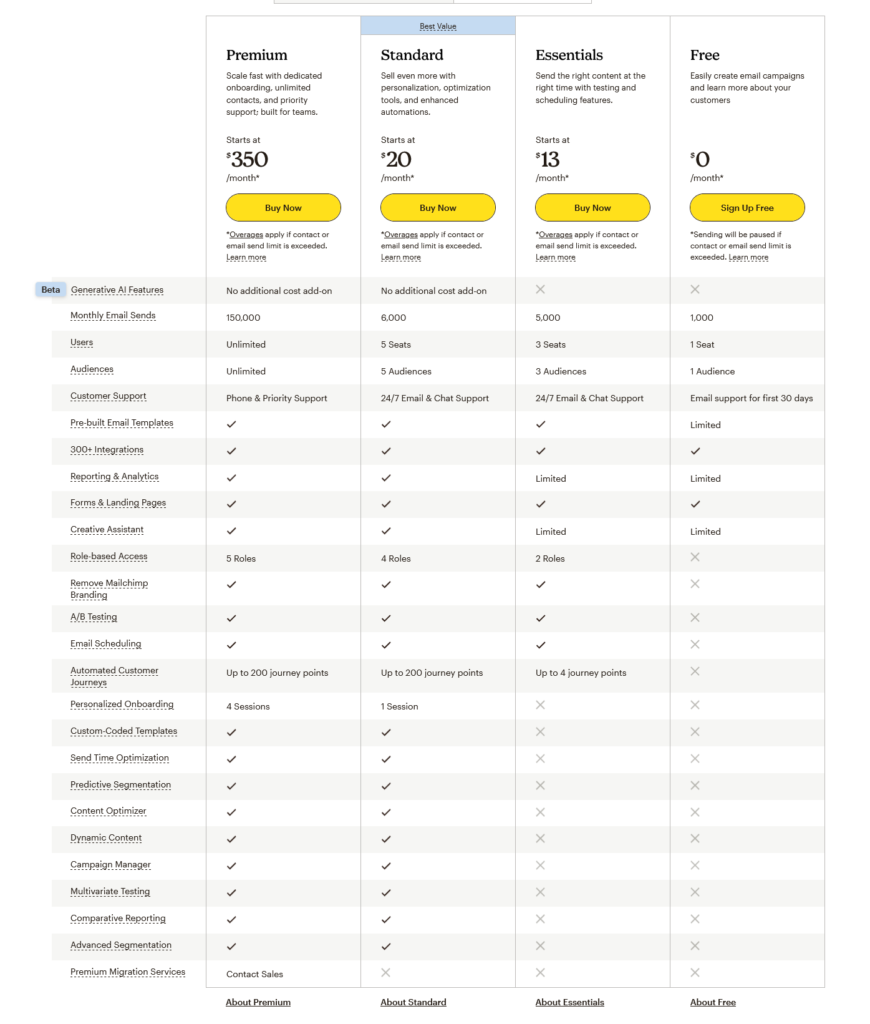
You can checkout the detailed feature list for all packages here.
Which is More Cost-Effective?
Determining which platform is more cost-effective depends on your specific business needs and the features you require. ActiveCampaign may offer more advanced features and flexibility in its pricing tiers, making it a better choice for businesses looking for comprehensive marketing automation solutions. However, MailChimp’s Free plan and lower-tier pricing options may be more suitable for startups and small businesses with limited budgets. Consider factors such as the size of your contact list, required features, and long-term growth plans when evaluating the cost-effectiveness of each platform.
Email Marketing Features
When comparing ActiveCampaign vs MailChimp for your email marketing needs, it’s essential to evaluate the features offered by both platforms. Let’s explore the key email marketing features of each platform to help you determine which one aligns best with your requirements.
ActiveCampaign:
ActiveCampaign provides a comprehensive set of email marketing features designed to help businesses create engaging and personalized email campaigns. Some of the notable features include:
- Drag-and-Drop Email Editor: ActiveCampaign offers a user-friendly drag-and-drop email editor that allows you to create visually appealing emails without any coding knowledge. You can choose from a variety of pre-designed templates or customize your own design to match your brand.
- Automation Workflows: With ActiveCampaign’s automation workflows, you can set up automated email sequences based on subscriber actions, triggers, and conditions. This allows you to deliver targeted messages at the right time, increasing engagement and conversions.
- Personalization: ActiveCampaign enables you to personalize your email content with merge tags and dynamic content blocks. You can tailor your messages to individual subscribers based on their behavior, preferences, and demographics, resulting in higher engagement rates.
- Segmentation and Targeting: The platform offers robust segmentation and targeting capabilities, allowing you to create segments based on various criteria such as demographics, engagement history, and purchase behavior. This helps you send relevant and targeted emails to different audience segments.
- A/B Testing: ActiveCampaign allows you to conduct A/B tests to optimize your email campaigns for better results. You can test different subject lines, email content, and send times to determine the most effective approach and improve your overall campaign performance.
- Reports and Analytics: ActiveCampaign provides detailed reports and analytics to track the performance of your email campaigns. You can monitor metrics such as open rates, click-through rates, conversion rates, and more to measure the effectiveness of your campaigns and make data-driven decisions.
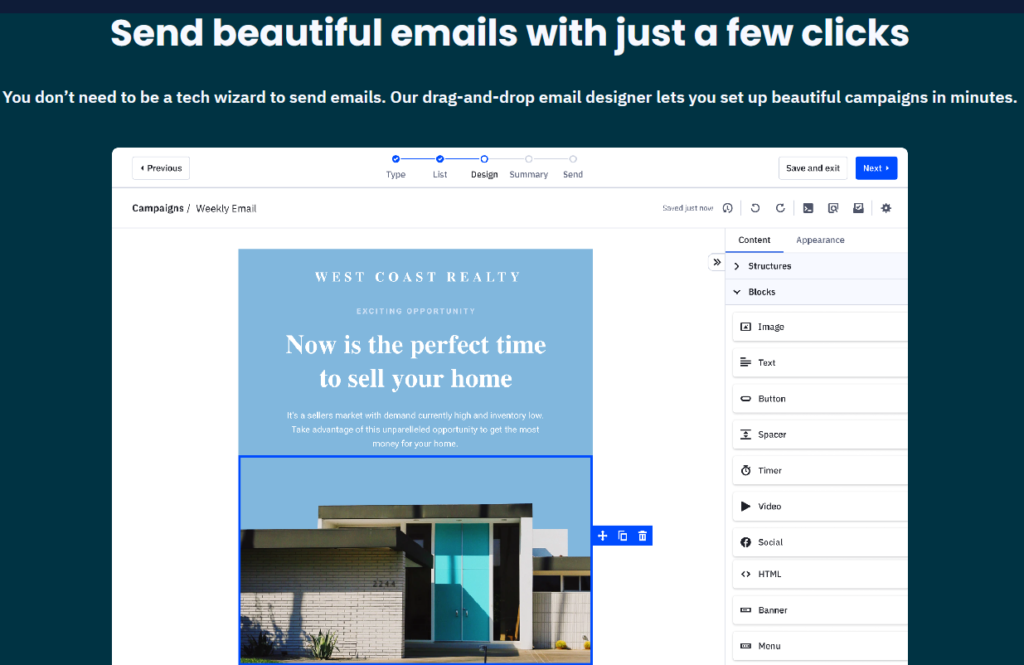
MailChimp:
MailChimp is known for its user-friendly interface and a wide range of email marketing features suitable for businesses of all sizes. Here are some of the key features offered by MailChimp:
- Email Templates: MailChimp provides a library of customizable email templates, making it easy to create professional-looking emails in minutes. You can choose from various layouts and styles to suit your brand and messaging.
- Automation: MailChimp’s automation features allow you to set up automated email sequences based on triggers such as sign-ups, purchases, or specific dates. You can nurture leads, onboard new subscribers, and re-engage inactive contacts automatically.
- Personalization: With MailChimp, you can personalize your email campaigns using merge tags and conditional content. This enables you to address subscribers by name and tailor your messages to their interests and preferences.
- Segmentation: MailChimp offers robust segmentation options, allowing you to divide your audience into targeted segments based on criteria like demographics, engagement, and purchase history. You can send highly relevant and targeted emails to different segments to maximize engagement and conversions.
- A/B Testing: MailChimp allows you to conduct A/B tests to optimize your email campaigns. You can test different subject lines, email content, send times, and more to identify the most effective strategies and improve your campaign performance over time.
- Reports and Analytics: MailChimp provides detailed reports and analytics to track the performance of your email campaigns. You can monitor open rates, click-through rates, and other metrics to evaluate the effectiveness of your campaigns and make data-driven decisions.

Automation and Workflow Automation
Automation plays a pivotal role in streamlining marketing processes and nurturing leads effectively. Both ActiveCampaign vs MailChimp offer automation features to help businesses automate repetitive tasks and deliver targeted messages to their audience. Let’s explore the automation capabilities of each platform:
ActiveCampaign:
ActiveCampaign provides robust automation and workflow automation tools designed to empower businesses to create personalized customer journeys and automate marketing tasks with ease.
- Automation Workflows: ActiveCampaign’s visual automation builder allows users to create complex workflows based on triggers, actions, and conditions. You can design automated sequences tailored to different stages of the customer lifecycle, from welcome emails to post-purchase follow-ups.
- Conditional Logic: With ActiveCampaign, you can incorporate conditional logic into your automation workflows to personalize communication based on subscriber behavior, interests, and demographics. This ensures that each subscriber receives relevant and timely messages, improving engagement and conversion rates.
- Dynamic Content: ActiveCampaign enables you to personalize content within your automation workflows using dynamic content blocks. You can customize email content based on subscriber data, such as location, past interactions, or purchase history, to deliver highly targeted and relevant messages.
Use Case Example 1:
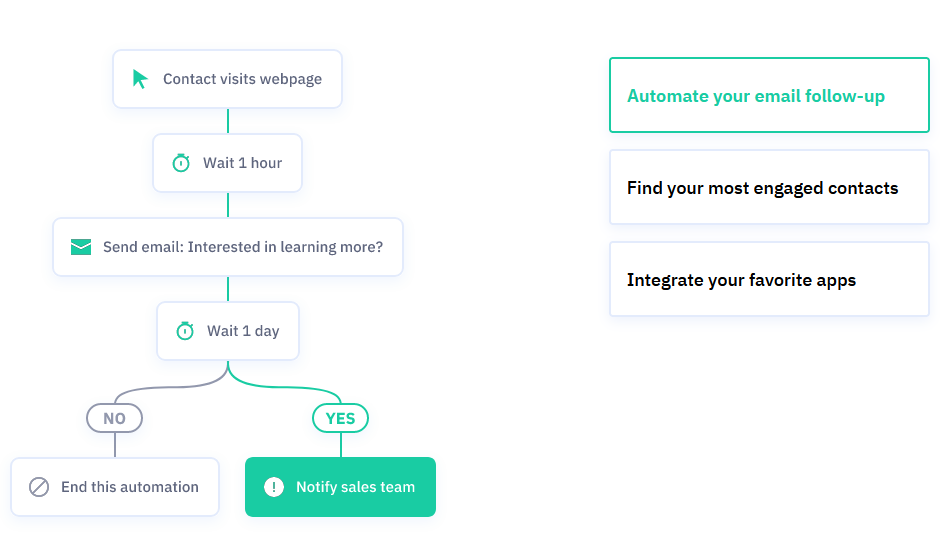
Use Case Example 2:
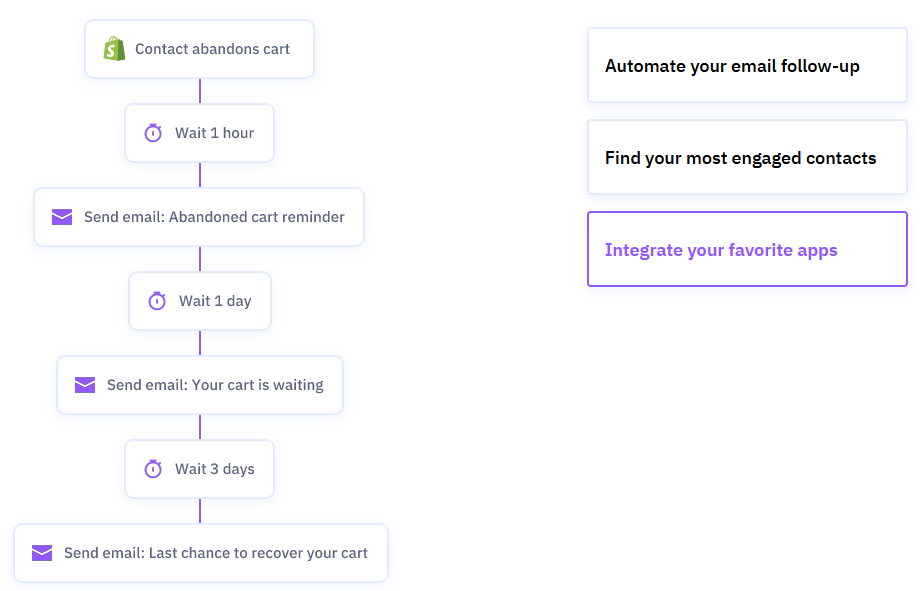
MailChimp:
MailChimp offers automation features that allow users to create automated email sequences based on subscriber actions, triggers, and conditions.
- Pre-built Automation Templates: MailChimp offers a library of pre-built automation templates, making it easy for users to set up automated email sequences for common marketing scenarios such as welcome emails, abandoned cart reminders, and follow-up campaigns.
- Simple Automation Builder: MailChimp’s automation builder provides a user-friendly interface for creating automated workflows. You can drag and drop automation blocks to design your sequences and customize settings such as timing and triggers.
- Basic Trigger Options: MailChimp allows users to trigger automated emails based on subscriber actions such as sign-ups, purchases, or specific dates. While not as flexible as ActiveCampaign’s conditional logic, MailChimp’s trigger options still enable businesses to automate key marketing tasks effectively.
Use Case Example 1:
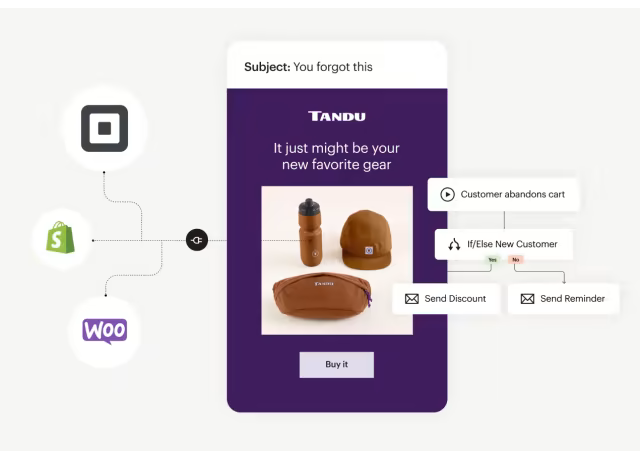
Use Case Example 2:
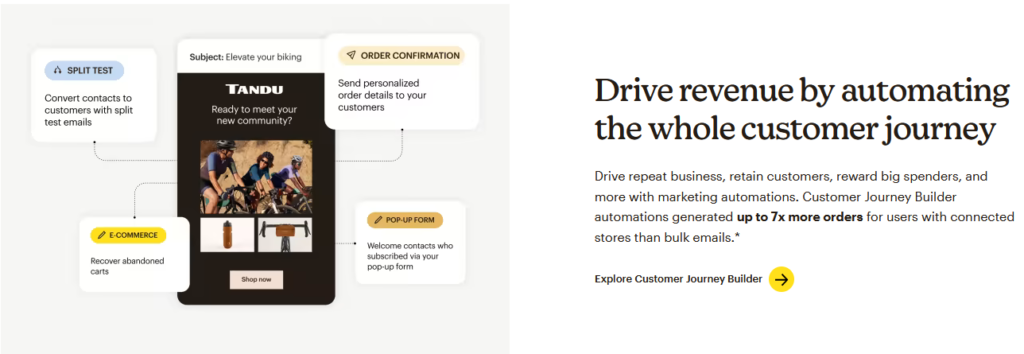
CRM and Contact Management
CRM (Customer Relationship Management) and contact management are crucial aspects of any marketing strategy, allowing businesses to organize, track, and engage with their contacts effectively. Let’s explore how ActiveCampaign and MailChimp handle CRM and contact management:
ActiveCampaign:
ActiveCampaign offers a comprehensive CRM system integrated with its marketing automation platform, providing users with a centralized hub for managing contacts, tracking interactions, and nurturing leads.
- Unified Contact Profiles: ActiveCampaign consolidates contact information from various sources, including email, social media, and website interactions, into unified contact profiles. This holistic view enables users to understand their contacts better and personalize communication based on their preferences and behavior.
- Lead Scoring and Tagging: ActiveCampaign allows users to assign lead scores and tags to contacts based on their engagement level, interests, and actions. This helps prioritize leads and segment contacts for targeted marketing campaigns, ensuring that the right message reaches the right audience at the right time.
- Automated Lead Nurturing: With ActiveCampaign’s automation capabilities, users can set up automated workflows to nurture leads based on predefined criteria and triggers. This includes sending targeted follow-up emails, assigning tasks to sales teams, and tracking lead interactions throughout the sales funnel.
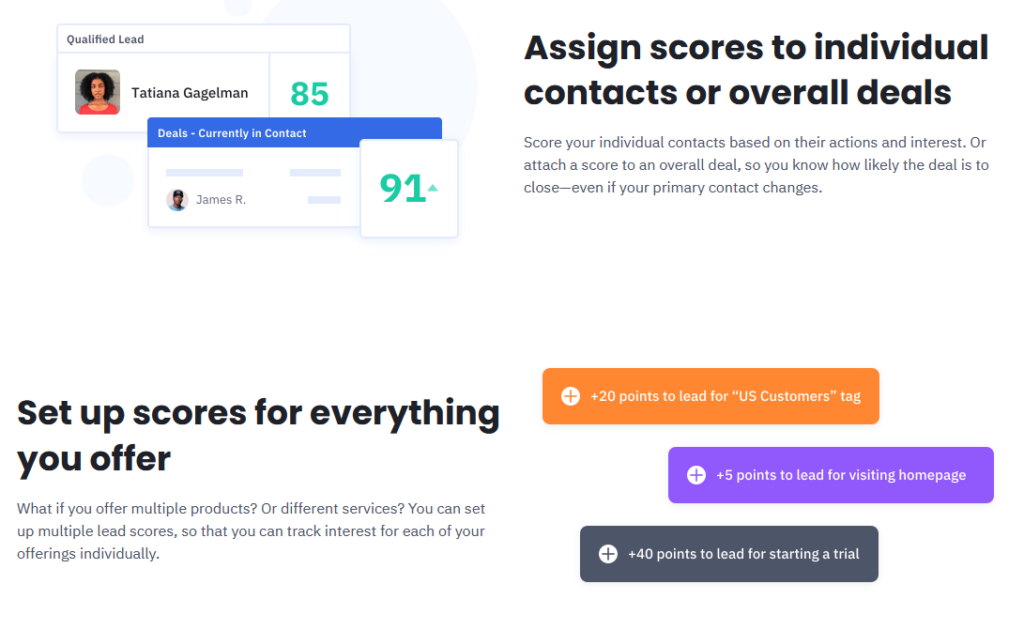
MailChimp:
MailChimp also offers contact management features to help users organize and engage with their audience, although its CRM capabilities are more limited compared to ActiveCampaign.
- Contact Lists: MailChimp enables users to create and manage contact lists effortlessly. Users can organize subscribers based on various criteria such as demographics, location, and subscription status. This feature allows for easy segmentation and targeting of specific audience segments.
- Merge Tags and Segmentation: With MailChimp, users can personalize email content using merge tags and segment contacts based on specific criteria. This segmentation functionality allows users to tailor their marketing messages to different audience segments, increasing relevance and engagement.
- Basic Automation Triggers: MailChimp’s automation features include a range of basic triggers such as welcome emails, abandoned cart reminders, and birthday greetings. While not as extensive as ActiveCampaign, these automation options still provide valuable tools for automating routine marketing tasks and nurturing leads.
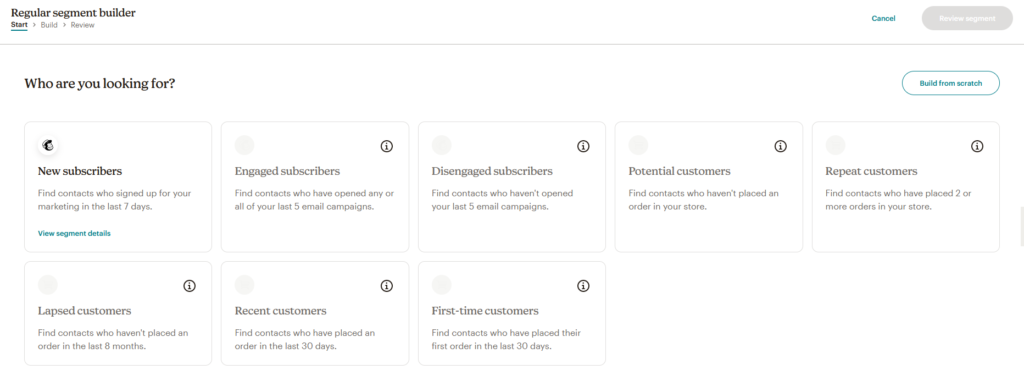
Reporting and Analytics
Effective reporting and analytics are essential for measuring the success of your email marketing campaigns and making data-driven decisions. Let’s delve into how ActiveCampaign vs MailChimp handle reporting and analytics:
ActiveCampaign:
ActiveCampaign provides comprehensive reporting and analytics tools to help users track the performance of their email campaigns and gain valuable insights into subscriber behavior.
- Detailed Campaign Reports: ActiveCampaign offers detailed reports on key metrics such as open rates, click-through rates, conversion rates, and revenue generated. Users can analyze the performance of individual campaigns and identify areas for improvement.
- Advanced Segmentation Analysis: With ActiveCampaign’s analytics, users can dive deeper into their audience segments and understand how different segments are engaging with their campaigns. This insight allows for more targeted and personalized marketing efforts.
- Automation Performance Tracking: ActiveCampaign tracks the performance of automation workflows, allowing users to monitor the effectiveness of their automated sequences and identify bottlenecks or areas for optimization.
MailChimp:
MailChimp also offers reporting and analytics features to help users measure the impact of their email marketing efforts and optimize campaign performance.
- Campaign Performance Reports: MailChimp provides reports on key metrics such as open rates, click-through rates, and bounce rates for each campaign. Users can track the performance of their campaigns over time and compare results across different email sends.
- Audience Insights: MailChimp’s analytics include audience insights that allow users to understand their subscribers better. Users can view demographic information, engagement trends, and subscriber growth to inform their marketing strategies.
- E-commerce Tracking: MailChimp offers e-commerce tracking features that allow users to monitor the revenue generated from email campaigns and track the ROI of their marketing efforts. This functionality is particularly useful for online businesses looking to measure the impact of their email marketing on sales.
Integration and Compatibility
Seamless integration with other tools and platforms is crucial for maximizing the effectiveness of your email marketing efforts. Let’s explore how ActiveCampaign vs MailChimp integrate with other systems and services:
ActiveCampaign:
ActiveCampaign offers extensive integration options, allowing users to connect their email marketing platform with a wide range of third-party tools and services.
- CRM Integration: ActiveCampaign integrates seamlessly with popular CRM (Customer Relationship Management) systems such as Salesforce, HubSpot, and Zoho CRM. This integration enables users to sync contact data between their CRM and ActiveCampaign, ensuring a unified view of customer interactions.
- E-commerce Platforms: ActiveCampaign integrates with leading e-commerce platforms like Shopify, WooCommerce, and BigCommerce. This integration enables users to track e-commerce activity, such as purchases and abandoned carts, and automate targeted email campaigns based on customer behavior.
- Lead Generation Tools: ActiveCampaign integrates with various lead generation tools and form builders, including Leadpages, OptinMonster, and Sumo. This integration allows users to capture leads directly into ActiveCampaign and automate follow-up sequences to nurture leads into customers.
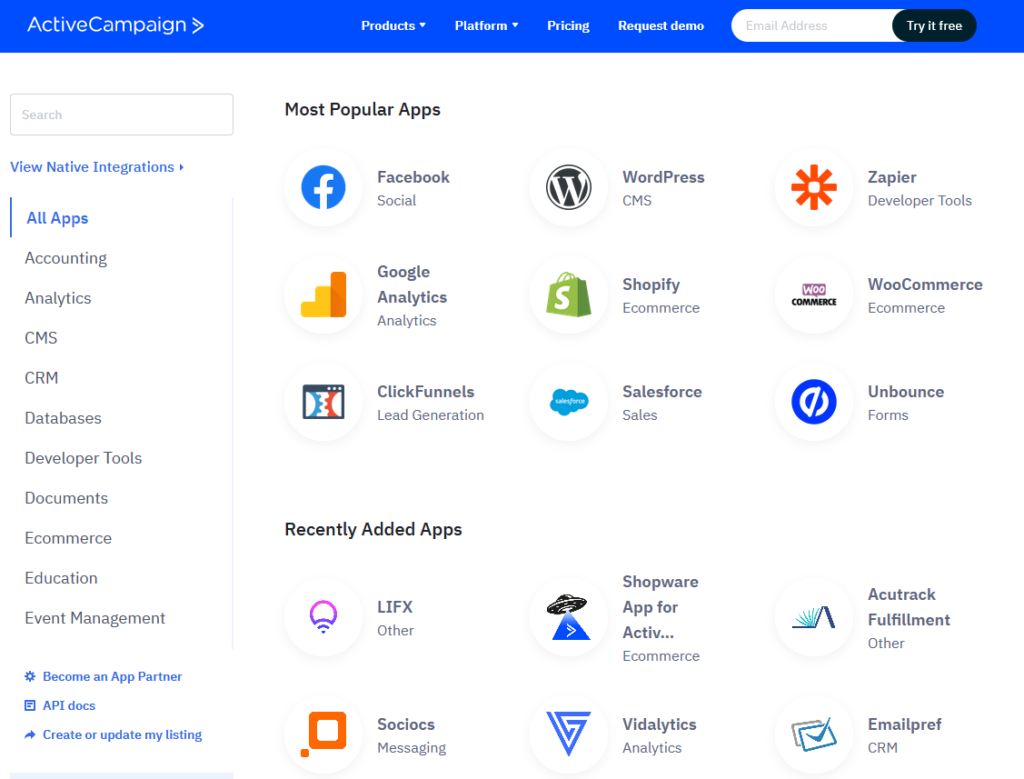
MailChimp:
MailChimp also offers a wide range of integration options to help users connect their email marketing platform with other tools and services.
- E-commerce Platforms: MailChimp integrates with popular e-commerce platforms such as Shopify, Magento, and WooCommerce. This integration enables users to sync customer data, track purchase behavior, and send targeted product recommendations and promotional emails.
- CRM Integration: MailChimp integrates with CRM systems like Salesforce and Microsoft Dynamics CRM. This integration allows users to sync contact data between their CRM and MailChimp, ensuring consistency across platforms and enabling more targeted marketing campaigns.
- Social Media Integration: MailChimp offers integration with social media platforms such as Facebook and Instagram. This integration allows users to create social media ads directly within MailChimp and track the performance of their campaigns alongside their email marketing efforts.
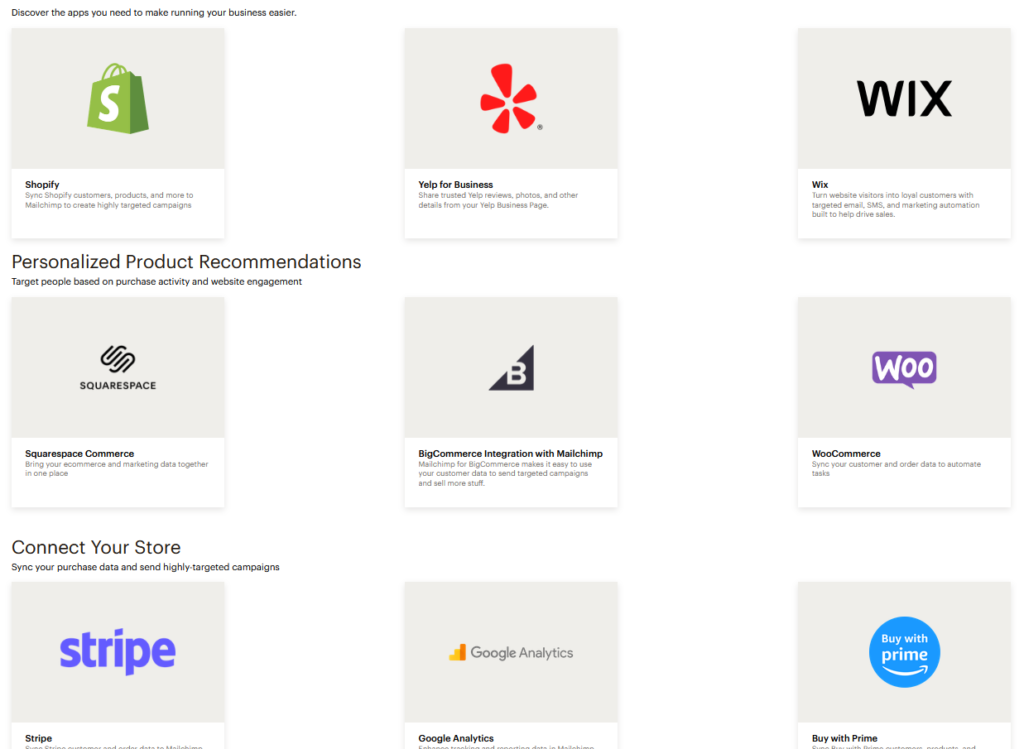
Ease of Use and User Interface
A user-friendly interface is essential for maximizing productivity and efficiency when using email marketing software. Let’s evaluate the ease of use and user interface of ActiveCampaign vs MailChimp:
ActiveCampaign:
ActiveCampaign boasts an intuitive user interface designed to streamline the email marketing process and enhance user experience.
- Dashboard: ActiveCampaign’s dashboard provides users with a clear overview of their email marketing activities, including recent campaigns, automation workflows, and contact engagement metrics. The dashboard layout is customizable, allowing users to prioritize the information most relevant to them.
- Navigation: ActiveCampaign features a straightforward navigation menu that makes it easy to access different sections of the platform, such as campaigns, automation, contacts, and reports. Users can quickly find the tools and features they need without getting lost in complex menus or submenus.
- Drag-and-Drop Editor: ActiveCampaign’s drag-and-drop email editor simplifies the process of creating visually appealing email campaigns. Users can customize email templates, add images and text, and rearrange content blocks with ease, even without any coding knowledge.
MailChimp:
MailChimp is renowned for its user-friendly interface, which caters to both beginners and experienced marketers alike.
- Dashboard: MailChimp’s dashboard provides users with a centralized hub for managing their email marketing campaigns. From the dashboard, users can access recent campaigns, audience insights, and automation workflows, allowing for quick and easy navigation.
- Simplified Campaign Creation: MailChimp offers a simple and intuitive campaign creation process, guiding users through each step of designing and sending an email campaign. The platform’s email editor features a drag-and-drop interface, making it easy to customize email templates and add content elements.
- Clear Navigation Structure: MailChimp’s navigation menu is organized logically, with categories such as Campaigns, Templates, Audience, and Reports. This clear structure makes it effortless for users to find the tools and features they need to manage their email marketing efforts.
Scalability and Growth Potential
When choosing an email marketing platform, it’s essential to consider its scalability and potential for accommodating your business’s growth. Let’s assess the scalability and growth potential of ActiveCampaign vs MailChimp:
ActiveCampaign:
ActiveCampaign is designed to scale with your business, offering advanced features and flexible pricing plans to accommodate businesses of all sizes.
- Flexible Pricing Tiers: ActiveCampaign offers a range of pricing plans tailored to different business needs and budgets. Whether you’re a small startup or a large enterprise, ActiveCampaign’s pricing structure allows you to scale up or down as your business grows and evolves.
- Advanced Automation Capabilities: ActiveCampaign’s advanced automation features empower businesses to create complex workflows and personalized customer journeys. As your business expands, you can leverage automation to scale your marketing efforts and engage with a larger audience without sacrificing efficiency or personalization.
- Robust Integration Options: ActiveCampaign integrates seamlessly with a variety of third-party tools and services, providing flexibility and scalability as your business adopts new technologies and expands its marketing stack. This integration capability ensures that ActiveCampaign can grow alongside your business and adapt to changing needs.
MailChimp:
MailChimp is a popular choice for businesses of all sizes, offering scalability and growth potential through its user-friendly platform and extensive feature set.
- Affordable Pricing Plans: MailChimp’s pricing plans cater to businesses of all sizes, with a free plan available for beginners and affordable paid plans for businesses looking to scale their email marketing efforts. This flexibility allows businesses to start small and upgrade as their subscriber list and marketing needs grow.
- User-Friendly Interface: MailChimp’s intuitive interface makes it easy for businesses to manage their email marketing campaigns, regardless of their size or level of expertise. Whether you’re a solo entrepreneur or a large enterprise, MailChimp’s user-friendly platform ensures smooth scalability and seamless campaign management.
- E-commerce Integration: MailChimp’s integration with leading e-commerce platforms enables businesses to leverage their online stores for growth. By syncing customer data, tracking purchase behavior, and sending targeted product recommendations, MailChimp helps businesses drive sales and expand their customer base.
Pros and Cons
Before making a decision between ActiveCampaign vs MailChimp, it’s essential to consider the strengths and weaknesses of each platform.
ActiveCampaign:
Pros:
- Advanced Automation: ActiveCampaign offers robust automation capabilities, allowing businesses to create complex workflows and personalized customer journeys.
- Deep Personalization: With dynamic content and conditional logic, ActiveCampaign enables deep personalization of email campaigns, resulting in higher engagement and conversion rates.
- Comprehensive CRM: ActiveCampaign’s integrated CRM system provides a centralized hub for managing contacts, tracking interactions, and nurturing leads effectively.
- Flexible Pricing: ActiveCampaign offers flexible pricing plans to accommodate businesses of all sizes, with scalable options to support growth and expansion.
- Extensive Integration: ActiveCampaign integrates seamlessly with a wide range of third-party tools and services, providing flexibility and scalability for businesses.
Cons:
- Learning Curve: Due to its advanced features, ActiveCampaign may have a steeper learning curve for beginners compared to simpler email marketing platforms.
- Higher Pricing: While ActiveCampaign offers flexible pricing plans, it may be more expensive for businesses with larger subscriber lists or advanced automation needs.
- Complexity for Basic Needs: Some users may find ActiveCampaign’s extensive feature set overwhelming, especially if they only require basic email marketing functionality.
MailChimp:
Pros:
- User-Friendly Interface: MailChimp’s intuitive interface makes it easy for beginners to create and manage email marketing campaigns without extensive training.
- Affordable Pricing: MailChimp offers a free plan for beginners and affordable paid plans for businesses of all sizes, making it accessible to businesses with varying budgets.
- Wide Range of Templates: MailChimp provides a variety of professionally designed email templates, allowing users to create visually appealing campaigns quickly.
- Integration with E-commerce Platforms: MailChimp integrates seamlessly with popular e-commerce platforms, enabling businesses to track sales and send targeted product recommendations.
- Basic Automation Features: While not as advanced as some other platforms, MailChimp offers basic automation features such as welcome emails and abandoned cart reminders.
Cons:
- Limited Automation: MailChimp’s automation capabilities are more limited compared to platforms like ActiveCampaign, making it less suitable for businesses with complex automation needs.
- Basic Reporting: MailChimp’s reporting and analytics features may be less comprehensive compared to other platforms, limiting the depth of insights available to users.
- Less Personalization Options: While MailChimp allows for basic personalization of email content, it may lack the depth of personalization options available in more advanced platforms.
Conclusion and Recommendation
Choosing the right email marketing platform is a crucial decision for any business, and comparing ActiveCampaign and MailChimp can help you make an informed choice based on your specific needs and goals.
ActiveCampaign shines with its advanced automation capabilities, deep personalization options, and comprehensive CRM system. It’s ideal for businesses looking to create complex, highly targeted campaigns and nurture leads effectively. However, it may have a steeper learning curve and higher pricing for businesses with advanced automation needs.
On the other hand, MailChimp offers a user-friendly interface, affordable pricing plans, and a wide range of templates. It’s a great option for beginners and small businesses looking to get started with email marketing quickly. However, its automation features may be more limited, and it may lack the depth of personalization options available in more advanced platforms.
Ultimately, the best choice depends on your business’s unique requirements, budget, and level of expertise. We recommend assessing your marketing goals, subscriber list size, automation needs, and integration preferences before making a decision.
Whether you opt for the advanced capabilities of ActiveCampaign or the user-friendly simplicity of MailChimp, both platforms can help you engage with your audience, drive conversions, and grow your business through effective email marketing strategies.
If you’re still unsure which platform is right for you in the ActiveCampaign vs MailChimp debate, consider taking advantage of free trials or consulting with experts to evaluate your options further. Regardless of your choice, investing in a reliable email marketing platform is essential for building lasting relationships with your customers and achieving long-term success in your marketing efforts.


